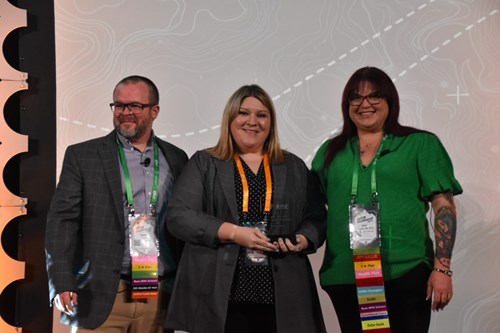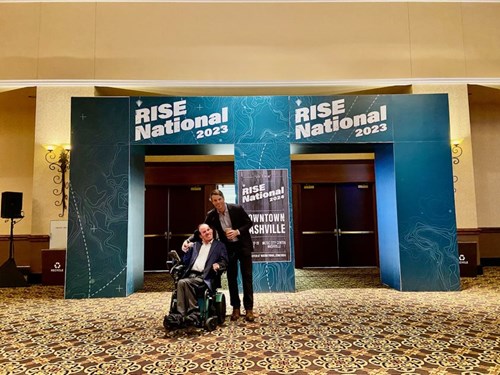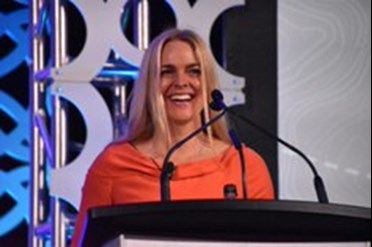The learning continued during the final day of our mega Medicare Advantage conference with two keynotes, specialized sessions in five concurrent tracks, interactive roundtables, and a look at health care trends in 2023. Here are the highlights:
We kicked off the last full day of the conference with a round of speed-networking roundtable sessions, followed by the presentation of the prestigious Dr. Martin L Block Award for Innovation & Excellence. The annual award is given to an individual who has advanced the lives of America’s seniors through clinical leadership, policy vision, and by superior example of the RISE mission to promote co ntinuous improvement in the health care system.
ntinuous improvement in the health care system.
Our 2023 recipient: Elizabeth “Liz” Haynes, director of risk adjustment and stars for government programs at Blue Cross and Blue Shield of Kansas City (BlueKC). Haynes, a registered nurse and department vice president for stars and risk adjustment programs at BlueKC, was chosen for meeting the needs of the seniors in the Kansas City community and helping the health plan achieve a 4-Star rating for the last three consecutive years.

Conference cochairs Kaleb Holt from SelectHealth (L) and Nikki Hungate from MVP Health Care (R) with Elizabeth Haynes after the Block Award presentation.
Haynes joined BlueKC in 2019 as the director of quality and stars and immediately identified opportunities to ensure the health plan took actions to meet the needs of its Medicare Advantage population as a plan and through its provider partners. She was selected as our 2023 Block Award winner out of a field of 11 nominees.
Shout out to all our nominees for their incredible work:
- Finalist: Rosemary Kennedy, chief health informatics officer, Connect America
- Finalist: George Rapier, M.D., CEO, WellMed Medical Management
- Shannon Decker, Ph.D., founder/consultant, VBC One
- Chris Gibbons, M.D, MPH, CEO, The Greystone Group
- Daniel Alkon, chief scientific advisor, Synaps Dx
- Sheila Owens Collins, M.D., commissioner for health, Lexington-Fayette County, Washington D.C.
- Jan Lee, M.D., CEO, Delaware Health Information Network
- Hossam Maksoud, CEO, Community Care RX
- Marci J. Chodroff, M.D., vice president, medical affairs, MagellanRx Management, a Prime Therapeutics company
- Michael C. LaFerney, psychiatric clinical nurse specialist, Arbour Couseling Services Fall River

Inspiring keynote from brother Ironman Champion Triathletes
Special thanks to Inovalon for sponsoring a fabulous keynote by brothers Brent and Kyle Pease, who have inspired so many by their bond and accomplishing feats that others might believe are impossible. Kyle was born with spastic quadriplegia cerebral palsy that affects his movement and posture. Although he uses a wheelchair full time, Kyle has not let that stop him from fully embracing life and challenging himself. And with the support of his brother Brent, he has participated in the Boston Marathon, Ironman World Championships, and has earned a spot on the US paralympic team.

The endurance athletes made Ironman history in October 2018 as the second ever wheelchair duo assist team to compete in the grueling Ironman World Championship in Kona, Hawaii. They have also established The Kyle Pease Foundation, which is dedicated to improving the lives of people with disabilities through sports and creating opportunities of inclusion for every person with a disability.
During the keynote address, Brent said that his parents refused to accept that Kyle would never live a full life even after a doctor told them Kyle would not live past the age of eight years old. The family brought Kyle along everywhere and Brent said he wanted to continue that role as they became adults. When Kyle watched Brent compete in an Ironman triathlon, he wanted to know if someone in a wheelchair could participate. And so began the brothers’ journey to become Ironman World Champions.
“I saw people that that day walk, crawl, do whatever they had to get to the finish line and in the back of my mind, I wondered if I can do this,” Kyle said. “One thing about me is I’m stubborn so if someone says no, I’m going to find a way to say yes.”
The two are each other’s biggest supporters. Brent provides the physical and Kyle provides the motivation and enthusiasm. “All of us have cheerleaders in our lives,” said Brent. ”On the racecourse, Kyle is mine.”
Kyle said he is an average person, trying to get by in the world. “I draw inspiration from Brent, my family, my friends, and The Kyle Pease Foundations. It’s amazing how far we’ve grown but we have a long way to go to have inclusion for everyone.”
Their tips to “find your finish” when life throws obstacles in your way:
“Motivation follows actions. Make those first steps.”
“Life is hard. In fact, life sucks sometimes. But you have to embrace the suck because the suck makes you strong.”
“Think about how can you push beyond your limits and reach your fullest potential.”
“How do you find your finish, your possible? You go after it and be the best you can be.”
Keynote Dr. Wendy Sue Swanson on health care and rapidly changing technology
Next, Swanson took the stage to provide her take on the intersection of health care and technology, including the possibilities, challenges, and her concerns. A pioneer in the use of digital space to provide humanistic doctor-patient information, Swanson said the science fiction from our childhood is now collapsing into our reality.

Swanson, who currently serves as the director of digital of health, professor, Sean N. Parker Center for Allergy and Asthma Research, Stanford University, has long been a proponent of digital tools, believing it can bring care and value in the health care space. But she says artificial intelligence chat technology has become increasingly human, more confusing, and there will be a growing temptation to get rid of people in jobs and use robots instead.
“It may be good,” she said. "AI in health care has been used in triage, diagnosis support, and has supported clinicians in an incredible way to be smarter and faster. But in the past three months we’ve been seeing the beginning of computers acting at the front of health care. And you need to ask, Do you want to talk with a robot or a person?”
As new technology emerges, she said it’s important that we make sure these solutions are safe, efficacious, and convenient.
Patients, Swanson said, need choice and transparency. For example, ask whether they want to get test results by text message or by phone call. “Don’t make the decision for them. Whenever we do something new, think really carefully, are you garnering and gaining informed consent? Am I clearly explaining the risks and benefits? So, as we go through this, think about choice, transparency, and think about informed consent.”
ChatGBT, an AI chatbot developed by OpenAI, launched in November. When she saw it in use for the first time, she found it mind-blowing. Her eighth-grade son began using the technology for homework by December. The computers sound so human that it is difficult to determine if you are talking to a robot or human. “This will be lifechanging technology.”
But will it be helpful or cause more problems? Swanson said it’s unclear but those who embrace innovation will outperform those who do not. “I love AI. I think it’s amazing, but I want AI to make us smarter,” she said. “I want a robot to help me be a thinker, an executive, but we have to be careful how we use robots. All of the sudden, robots take over as how we talk as human beings. Maybe in 10 years it will be different, but right now I sincerely believe we have to be careful about informed consent and transparency as we do it. I want to bring in the robots and keep the people.”
